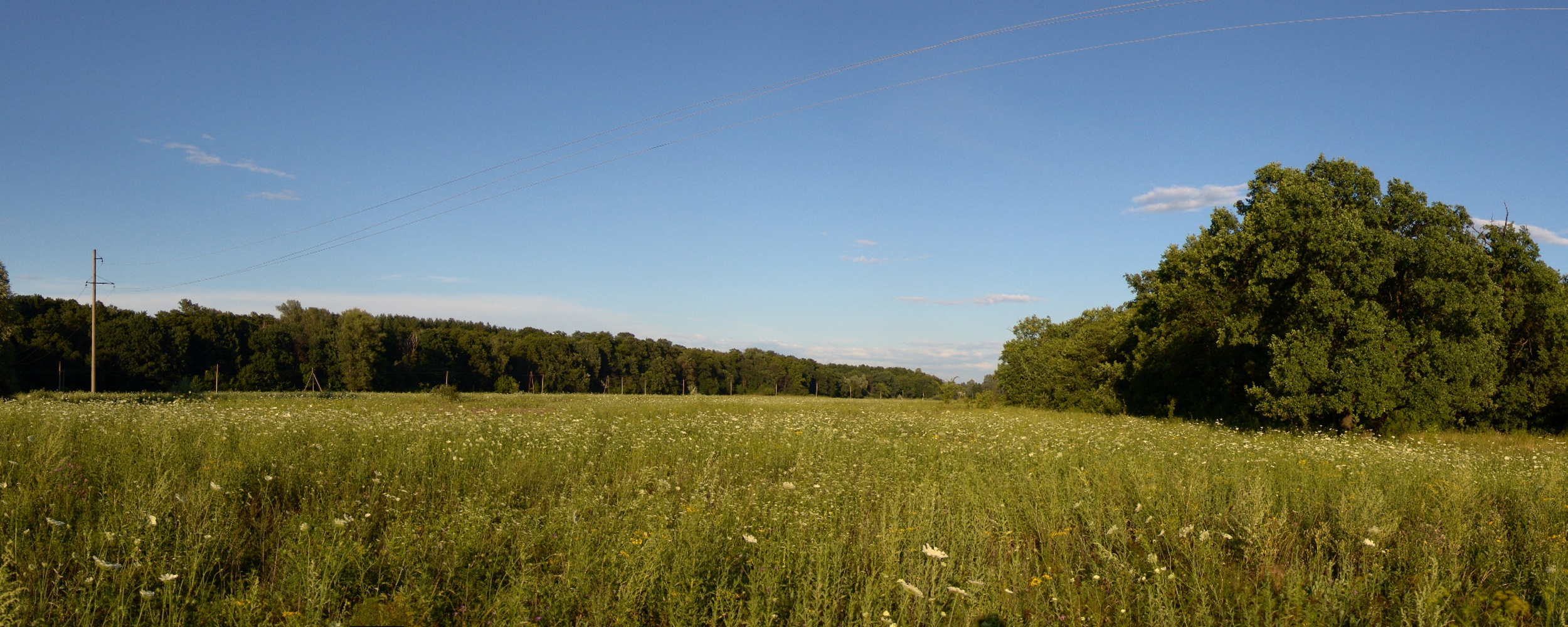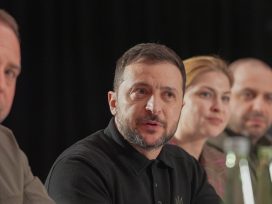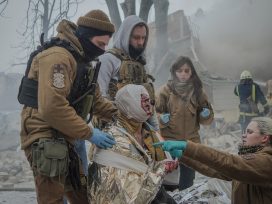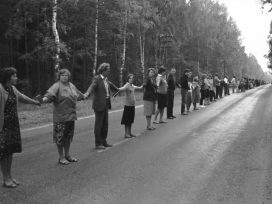Seven dillweeds
Eurozine is pleased to publish a new literary voice from Ukraine, Vladimir Rafeenko, who appears here in English for the first time with a chilling short story about the conflict in Donbas. Translated from the Russian by historian Marci Shore.
Introductory note
Vladimir Rafeenko (b. 1969) is a Russian-language Ukrainian writer who had spent his whole life in the city of Donetsk, in the eastern Ukrainian mining region called the Donbas, until the war between Russian-supported separatists and the Ukrainian state broke out in spring 2014. He now lives near Kiev. Семь Укропов (Sem’ Ukropov), in English ‘Seven Dillweeds,’ is a mini-novella taken from Rafeenko’s longer work Долгота дней (Dolgota dnei, The Length of the Day), published in 2017. The literal translation of ukrop – ‘dillweed’, or simply ‘dill’ – does not capture the meaning of the word in this context: ukrop is pejorative slang used by Russians to describe Ukrainians. Among other references requiring explanation: Stepan Bandera (1909-1959) was the leader of one faction of the Organization of Ukrainian Nationalists, a radical nationalist group active in the 1930s and 1940s. ‘Westerners’ refers here to people from western Ukraine. Viy is a horror story by Nikolai Gogol published in 1835. The eponymous Viy is a demonic spirit who appears in Gogol’s story as King of the Gnomes; a Soviet film adaptation was released in 1967. Right Sector (Pravyi Sektor) is a right-wing nationalist group formed during the recent Ukrainian revolution on the Maidan whose volunteer battalions have been fighting against the separatists in the Donbas.
Marci Shore

A field in the Donbas. Photo: spoilt.exile. Source: Flickr
Seven dillweeds
by Vladimir Rafeenko
Pasha loved his stepfather. He had always considered him his father. Matvei Ivanovich was solid and sturdy. Everything that had to be done at home he did himself. He had come into Nina Ivanovna’s family like a blessing from God. She herself would never have managed to raise her son. After the death of her own father, Pashka’s grandfather, who had always helped with money and food, Nina Ivanovna had fallen into despair. She worked two jobs, but even so there was never enough money. And Pashka was a sickly child, who required nourishment. Matvei Ivanovich, having appeared out of the blackness of the coalminers’ night, took the boy under his protection, and succeeded in winning his heart.
Matvei Ivanovich had come there at a mature age; he’d come because of his ‘work transfer.’ And as he himself admitted, it wasn’t that he didn’t like Ukraine, it was more that he didn’t understand it. As he would say to the boy he was raising: ‘I don’t understand the Ukrainian language, son, and also all these complicated things with Stepan Bandera. I don’t like westerners, you understand? They’re barbaric somehow. Just barbaric people. And they only hang around with each other. Back at home there were a few of them working at our mine. And they only talked to their own and only in their own way. They even got beaten for that more than once. I don’t think there was any sense in that, though – just made them more spiteful. And so I figure: once you’ve got people like that, what can you do with them?’
He polished off the next glass and sniffed a crust of bread.
‘Although the fact of the matter is: who’s this Bandera anyway? He’s just some agronomist, after all. Look at me: I’m an agronomist, too. My first degree is in agronomy. I even graduated from an institute. And what, they’re going to put up a monument to me? And the Russian language, let’s agree, is more beautiful and expressive, that’s a fact. And now I’ll explain to you why: in the first place, my grandmother, Nastasiia Aleksandrovna, spoke it. By the way, she was a professor of geology. They sent her to rot in Kolyma in ’42. And in the second place, they’re smart people in general. Gagarin, for example. Gogol. You get it, Pashka? Gogol! Dead Souls, Pasha! You’ve read that book?’
‘No, not that one.’ The boy shrugged his shoulders and turned very red.
‘Too bad for you – you should have!’
Matvei Ivanovich shook his head. ‘Though, frankly speaking, I haven’t waded through it either. Viy is somehow more my thing. You know that film? Go see it! First-rate old cinema. A true classic work… But that’s not what we’re talking about!’
Matvei Ivanovich lit his cigarette and gathered his thoughts. ‘Better you tell me: so they had that one agronomist, and now so what? What are we supposed to do now – forget our language?’
He shook his head.
‘In my opinion, it’s all stupid. And they say: go on, forget your language!’
Matvei Ivanovich tilted his head in a funny way, waved his hands, poured himself another shot of vodka, grabbed a half-salted pickle.
When the shooting started in town, Matvei Ivanovich proceeded to study the situation. By then he’d already left his job, since he had a solid pension and at any rate the miners weren’t being paid any more. So he had time on his hands to learn about the state of the world. He walked around, talked to people. He would come back in the evening, tired, restless, but generally satisfied.
In the beginning of June, after he’d gotten his pension and the economy had sunk, Matvei Ivanovich was found in a city park, dead. He was lying in water with a sad smile and a deep gash on the right side of his neck. At the burial, Nina Ivanovna sobbed terribly. When they lowered the casket, she jumped into the pit. She tried to stab herself in the heart with a knife. But after a week she found work in the town centre as a janitor in a student dormitory, and in the new job she revived a little.
Pashka saw his stepfather every day in his dreams. There Matvei Ivanovich smiled and told stories, stories without endings and without beginnings, stories about coal, about Aleksandr Nevskii, about Belka and Strelka and the Battle of the Kalka. Truth be told, Pashka just caught the general tone, the details he could only make out hazily, as if through dirty glass. Eventually he signed up for the war against Right Sector, and thus for Gagarin and Gogol, and above all for Matvei Ivanovich, agronomist by his first diploma. They gave the boy a Kalashnikov and two magazine cartridges and sent him to fight with three dozen others like himself. It turned out, unfortunately, that in combat they were not alone – the enemy was there, too. And it quickly became clear that in a war, people kill each other. But truth be told, Pashka didn’t have time to make sense out of any of it.
As soon as they’d lain down at the edge of a field by a rivulet, which just in that spot turned towards the town at almost a right angle, the Ukrainian battalion attacked. The shooting was terrible, and the battle was short and chaotic. Pashka’s commander turned out to be a swine, moreover he wasn’t sober. Tossing his jammed submachine gun to the side, the commander scurried off into the man-made thicket. From there he moved through the ravines to the nearby village and disappeared from sight. And for a whole twenty minutes more, in the little river, young souls set off through the great heavenly ocean on a voyage of no return.
It was late when Nina Ivanovna returned from work. She boiled water for tea and started to cook dinner. She knew that Pashka wouldn’t be home that day, so she didn’t worry. After she’d eaten, she took out a bottle of port wine, opened it up, poured herself half a glass, drank it. Just then her neighbour, Maria Stepanovna, appeared. And just like that Maria Stepanovna told her how Pashka was sent into battle and killed. Maria Stepanovna’s husband, who was making some money as a driver for the new authorities, had been the first to get the news.
‘They left them all on a field by Mikhailov.’
Maria Stepanovna picked up a glass of port and downed it without wincing. She tossed a caramel into her mouth.
‘Just behind the little river. The path is to the right, and the creek flowing into the Kalmius is to the left. That’s where he’s lying. But it’s a long way there, and no one will give you a ride!’
Maria rubbed her hands together contentedly and got up.
‘And why is that?’ asked Nina Ivanovna.
‘Because those dillweeds are there! No one from town goes in that direction, don’t even think about it!’
‘So what am I supposed to do, leave my child there?’ Nina Ivanovna thought aloud. ‘It’s inhumane. Besides, it isn’t far if you cut through the fields.’
When Nina Ivanovna got there, it was after midnight. She searched for Pashka until the morning. And when she found him, she didn’t recognise him right away. Pashka, dead, had become calmer and more beautiful, although he looked very tired, even through death. Before he’d died, he’d managed to crawl to a nearby tree and lean up against it, and for the first second after Nina found him, she thought he was still alive, just exhausted and asleep. But he wasn’t asleep. Pashka could no longer be either asleep or awake. He was looking high above himself into the Ukrainian sky at his father, who in fact was his stepfather.
But the problem lay in something else: Nina was unable to drag him onto her back. Having thought about it for a while, she took off her old, long coat, spread it out on the ground, and wrapped up the corpse in it. Then, having pulled the sleeves under her armpits and tied them around her chest, she dragged the corpse through the furrow.
It was around nine o’clock in the morning, and she desperately felt like a drink. Having gotten port wine and bread out of her satchel, she sat, drank, ate, and looking at her son’s face, began to cry. The farther she went, the more his face decomposed in the heat. The upper lip rose, while the chin sank.
At midday a ZIL-130 Soviet truck with a passenger module appeared on the road. Half a dozen or so Ukrainian soldiers with the stripes of a volunteer battalion were inside. The truck passed by at first; then a few metres later, it stopped. For a minute the combatants examined the field with the little river, the battleground, the corpses, the scorching sun at its zenith, spreading picturesquely from the edge of the man-made thicket to its farthest reaches. Then a man with grey hair, whom the soldiers respectfully called Grey, asked the mother where she’d come from. Nina Ivanovna explained. She had difficulty finding words. Her heart was pounding, although she felt no fear of anything. It was only grief and thirst that tormented her.
After conferring among themselves, the boys dragged Pashka into the trailer body. They helped Nina climb in and sit by the feet of her son on an empty canister that had once held diesel oil. They rode for about forty minutes in a roundabout way, taking a detour so as not to run up against insurgents. They laid the corpse on the grass about a hundred metres before the turn into the village.
‘We won’t go any further, sorry!’ Grey said.
The burial took place a day later.
‘And among other things, that truck that gave you and your Pashka a lift – our guys shot it to pieces on the way back!’ Maria Stepanovna informed Nina.
Maria Stepanovna had come on the ninth day to pay respects to the dead. She downed a glass of vodka and began to crunch on a pickle.
‘And there were seven dillweeds in the truck, right?’
‘Seven people,’ rephrased Nina Ivanovna, feeling a fine, concentrated shiver run across her skin.
‘That’s what I said, seven! Those fascists from Kiev turned out to be – Maria Stepanovna nodded confidently – from Right Sector. Can you imagine? Fascists from Kiev! No, my friend, you were nothing less than terribly lucky! My God, terribly lucky!’
Published 21 August 2017
Original in Russian
Translated by
Marci Shore
First published by Eurozine (in English)
© Vladimir Rafeenko / Eurozine
PDF/PRINTIn collaboration with
In focal points
Newsletter
Subscribe to know what’s worth thinking about.
Related Articles

The ‘Trump–Putin deal’ again places Ukrainians in a subaltern role. The leaked contract with its fantasy $500 billion ‘payback’ has been compared to Versailles, but the US betrayal recalls nothing so much as Molotov–Ribbentrop.

Ukraine faces its greatest diplomatic challenge yet, as the Trump administration succumbs to disinformation and blames them for the Russian aggression. How can they navigate the storm?






